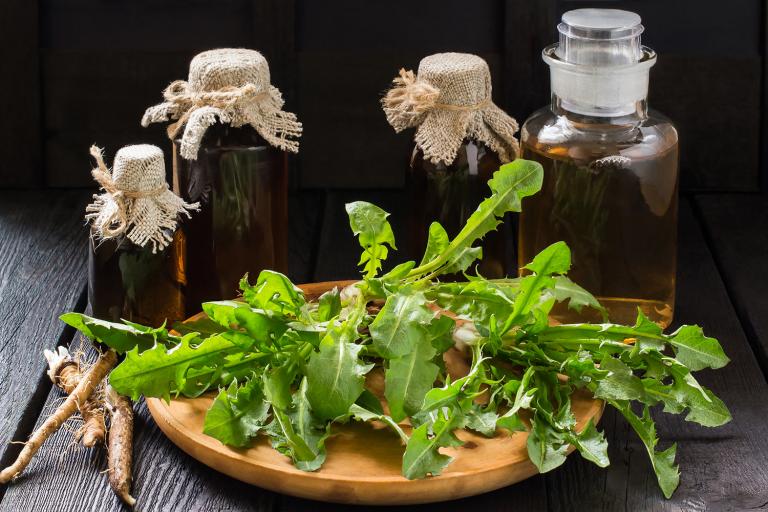With inadequate acid, the entire sequence of digestion may become compromised. In response to heartburn or upset stomach, many people reach for medications that neutralize or suppress stomach acid. But aiding—rather than suppressing—digestive secretions with a spoonful of bitters is often the key to correcting complaints.
What is HCl?
Adequate stomach, or gastric, acid is necessary for optimal digestion and nutrient assimilation. The major component of stomach acid is hydrochloric acid, or HCl. Secreted by parietal cells in the stomach, HCl reaches a pH value between 1 and 2, indicating high acidity. This acid is potent enough to dissolve an iron nail, yet it doesn’t normally erode the stomach, thanks to its protective mucous membrane lining.
Acid is necessary to digest and absorb protein. HCl also supports the digestion and absorption of carbohydrates, fats, and several vitamins. Hydrochloric acid is needed to optimally absorb minerals and vitamins that require an acidic environment: folic acid, ascorbic acid, beta carotene, non-heme iron, and some forms of calcium, magnesium, and zinc.
The presence of HCl in the small intestine stimulates peristalsis (wave-like muscle contractions that push food through the intestines), thereby contributing to regularity by promoting bowel motility. Gastric acid helps destroy parasites, bacteria, and fungi that may be present in food consumed. With low HCl, invaders may gain access deeper into the body, where they can cause harmful infections.
Reasons for Low HCl
Either intentionally or as side effects, over-the-counter medications can inhibit the production of stomach acid. Histamine (H2) blockers such as cimetidine (Tagamet), ranitidine (Zantac), famotidine (Pepcid), and nizatidine (Axid)—all commonly used to treat heartburn and indigestion—work by decreasing stomach acid production. Whether they contain aluminum (Maalox, Rolaids, Mylanta), calcium carbonate (Tums, Rolaids), or sodium bicarbonate (Alka-Seltzer), antacids raise the pH level of the stomach acid, neutralizing its effect.
Deficiency of some nutrients can also lead to impaired hydrochloric acid secretion. Folic acid is involved in HCl production, and oral contraceptives can contribute to a deficiency of this important B vitamin. Zinc deficiency can impair HCl secretion, which also declines with advancing age. Clinical studies have shown that chronic atrophic gastritis, a condition where little or no HCl is secreted, is common among older adults.
In addition, Helicobacter pylori bacteria (linked to peptic ulcers and even stomach cancer) cause digestive illness, decreasing levels of hydrochloric acid. When HCl is insufficient, proper digestion will not occur. Microorganisms normally destroyed by stomach acid can proliferate, raising the risk of gastrointestinal infections.
Bitters for Better Digestion
Although many Americans are unfamiliar with bitter-tasting foods and herbs, numerous cultures have valued bitter substances for improving digestion, nourishment, and overall health. Traditional European and Chinese medicine (TCM) believe that bitter foods and herbs can strengthen digestion and the nervous system, while improving the vital energy of the body.
Herbs for Bitters Formulas
According to Christopher Hobbs, LAc, AHG, author of Foundations of Health, bitter formulas (aka “bitters”) typically contain bitter-tasting herbs such as angelica root (A. archangelica), artichoke leaf (Cynara scolymus), bitter orange peel (Citrus aurantium), blessed thistle leaves (Cnicus benedictus), gentian root (Gentiana lutea), goldenseal rhizome (Hydrastis canadensis), wormwood leaves (Artemisia absinthium), and yarrow flowers (Achillea millefolium).
In formulas, bitters are often combined with carminative (gas-relieving) herbs such as ginger root (Zingiber officinale), fennel seed (Foeniculum vulgare), and cardamom seed (Elettaria cardamomum) to moderate their taste and take advantage of gas-relieving benefits. “Bitter greens such as the leaves of dandelion, arugula, chickory, and parsley or an unripe bitter plum are also beneficial before meals to enhance digestion,” says Hobbs. These foods and herbs stimulate the bitter receptors in taste buds at the back of the tongue, so tasting the bitterness improves herbs’ effectiveness.
How Do Bitters Work?
“Bitters stimulate gastric secretions, enzyme production, and help clear symptoms such as bloating, gas, and dyspepsia, and they improve elimination,” adds Hobbs, who is particularly fond of gentian root and artichoke leaf. “Pure gentian is very bitter but adds a refreshing taste when used in a formula,” he explains. Gentian root is typically used in teas, tinctures, fluid extracts, and dry extracts.
Approved by the German Commission E for fullness/bloating, flatulence, nausea, and loss of appetite—symptoms that can often be traced to insufficient stomach acid—gentian’s bitter substances stimulate stomach acid and saliva production and may also stimulate bile flow. However, individuals with stomach or duodenal ulcers should avoid this herb.
Artichoke leaf extract is often found in bitter formulas and is commonly used in tinctures, fluid extracts, and dry extracts. Found below the bud, the bitter leaf is a byproduct of the commonly eaten unopened artichoke flower head.
Approved by the Commission E for liver and gallbladder complaints and loss of appetite, artichoke leaf stimulates both appetite and production of bile. Essential for digestion and absorption of fats and fat-soluble vitamins, bile is produced by the liver, stored in the gallbladder, and secreted into the small intestine in the presence of food (particularly fatty food). Inadequate bile secretion can cause poor fat digestion and contribute to “dyspeptic syndrome” (digestive disturbances, flatulence, bloating, nausea, constipation, diarrhea, and loss of appetite). Clinical studies using artichoke leaf extract have shown significant improvement in these symptoms. But people with bile duct blockage may want to avoid artichoke leaf extract, and anyone with gallstones should consult a doctor before using the extract.
How to Take Digestive Bitters
Bitters are typically taken in small doses, enough to promote a strong taste. Approximately 1/2 to 1 teaspoon of the fluid extract, 1 dropper of the concentrated formula, or 2 teaspoons of a bitters tea is taken up to one half hour before meals.

